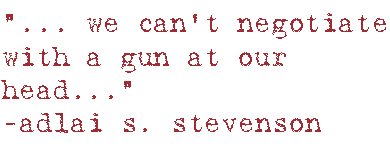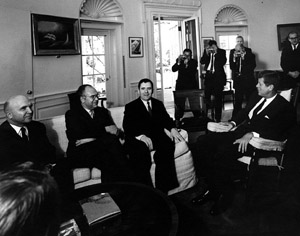Wednesday, 17 October 1962
Wednesday morning, 17 October, the United States Ambassador to the United Nations Adlai Stevenson encouraged the President to talk directly with Khrushchev in order to “afford a chance of uncovering his motives and objectives far better than correspondence thru (sic) the ‘usual channels.’” In the same letter to the President he highlighted that the US stance on Cuba is less justifiable to the Europeans “who have lived so long under the same threat of Soviet attack from bases in the satellite countries.”  Stevenson’s primary point to Kennedy is “I feel you should have made it clear that the existence of nuclear missile bases anywhere is negotiable [emphasis in original] before we start anything.” 11
Stevenson’s primary point to Kennedy is “I feel you should have made it clear that the existence of nuclear missile bases anywhere is negotiable [emphasis in original] before we start anything.” 11
Robert Kennedy received a message from Georgi Bolshakov conveying that Khrushchev wanted President Kennedy to know that the weapons being sent to Cuba were for defensive purposes only. Unfortunately, by the time this August message was relayed to Kennedy in October, he was fully aware of the MRBMs in Cuba. This created a deep rift in the relationship between Khrushchev and Kennedy.12 Khrushchev intended to convince the world that these missiles were defensive meant to aid Cuba and encourage the United States to respect Cuba’s sovereignty.
Unfortunately for Khrushchev, the timing of this message and the logical incongruity of the missiles as “defensive” led the President to seriously question the diplomatic integrity of the Soviets. President Kennedy viewed strategic weapons and strategic warfare is inherently offensive. For Americans, the assumption was that nuclear weapons would be used by the aggressor and there would only be a chance for a retaliatory strike if the capability was strong enough. Their mere existence threatened their use. Kennedy assumed that strategic weapons were offensive and therefore, he would not accept them, especially as deployed in Cuba, as defensive.
The next day this rift would be deepened still. At 5:00 p.m., Thursday, 18 October, the Soviet Foreign Minster Andrei Gromyko met with Kennedy (at Gromyko’s request) with an unidentified agenda.  Secretary of State Dean Rusk correctly suggested that the meeting would center on Berlin, with other topics such as nuclear weapons and disarmament, the meeting between Khrushchev and Kohler, and the planned visit by Khrushchev to the United States.13 During the meeting, President Kennedy reacted very harshly to Gromyko’s assertion “that the Soviet Union would never become involved in the furnishing of offensive weapons to Cuba.”
14 According to Sheldon Stern, “From that day on, JFK frequently referred to Gromyko as ‘that lying bastard.’” 15
Secretary of State Dean Rusk correctly suggested that the meeting would center on Berlin, with other topics such as nuclear weapons and disarmament, the meeting between Khrushchev and Kohler, and the planned visit by Khrushchev to the United States.13 During the meeting, President Kennedy reacted very harshly to Gromyko’s assertion “that the Soviet Union would never become involved in the furnishing of offensive weapons to Cuba.”
14 According to Sheldon Stern, “From that day on, JFK frequently referred to Gromyko as ‘that lying bastard.’” 15
This encounter set the tone for the Cuban Missile Crisis debate in very black and white terms. From the Soviet point of view, the Americans were piratical aggressors; from the American point of view, the Soviets were deceitful, aggressive opportunists. This caused Kennedy to look at the military option very seriously. At this point, Kennedy’s inclination was to use force.

